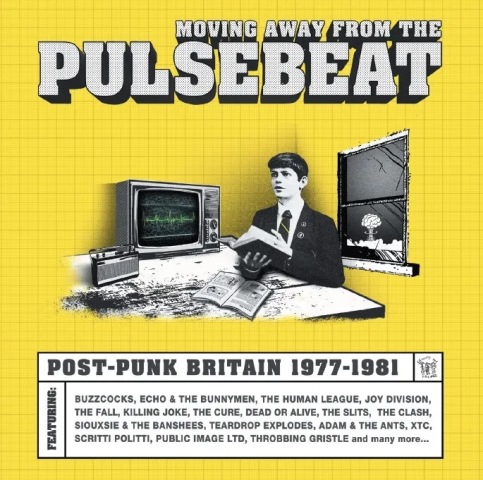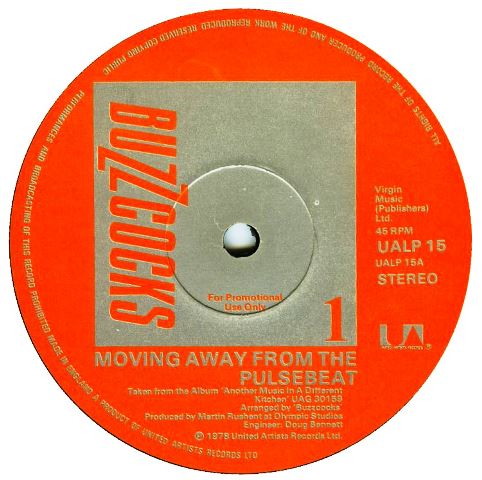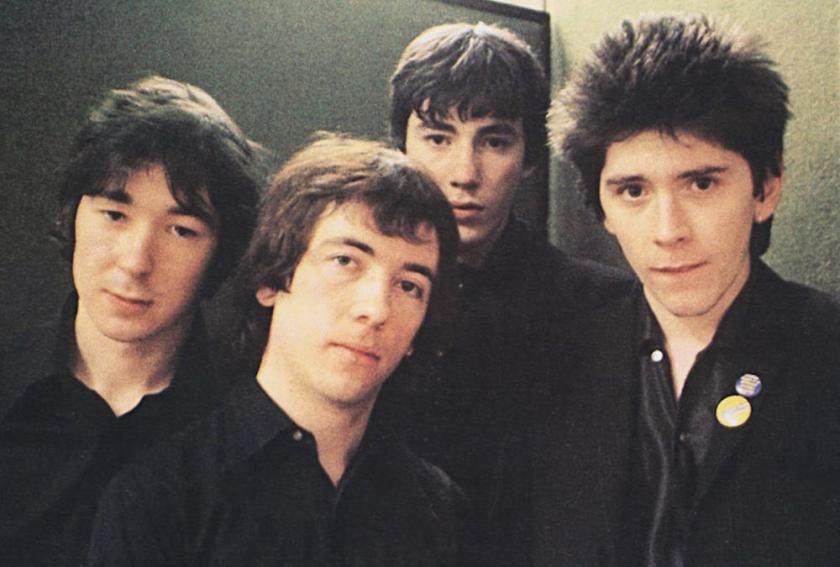“Moving Away from the Pulsebeat” is the final track – barring the locked-groove return of the two-note guitar refrain from “Boredom” – of Buzzcocks’ March 1978 debut album, Another Music In A Different Kitchen. At five minutes 40 seconds it didn’t cleave to the short, sharp punk template. Also, it was largely instrumental. And it had a drum solo.
Buzzcocks had emerged with punk yet weren’t going along with it or, rather, what it had been reflexedly characterised as. Their label, United Artists, had faith in “Moving Away from the Pulsebeat” and pressed it onto a one-sided promotional-only 12-inch single. Surprisingly, the music weekly Sounds reviewed this un-buyable record along with the rest of the week’s new singles. The verdict: “Quasi-headbanging riffing, brain damage monotony drumming and gratuitous lead guitar meanderings. It sounds to these jaded ears like they got a bit lost after the first two bars so they kept going and hoped for the best.”
 Later in 1978, Buzzcocks’ Pete Shelley contributed a sleeve note to Cannibalism, a double album compilation of pre-punk German individualists Can – also issued by United Artists. He wrote that he had been a fan since 1972, and pointed to “Halleluwah” and “Yoo Doo Right” as top picks. Play the latter and then “Moving Away from the Pulsebeat,” and the connection becomes clear. On their first album, Buzzcocks were nodding back to a particular pre-punk past.
Later in 1978, Buzzcocks’ Pete Shelley contributed a sleeve note to Cannibalism, a double album compilation of pre-punk German individualists Can – also issued by United Artists. He wrote that he had been a fan since 1972, and pointed to “Halleluwah” and “Yoo Doo Right” as top picks. Play the latter and then “Moving Away from the Pulsebeat,” and the connection becomes clear. On their first album, Buzzcocks were nodding back to a particular pre-punk past.
A little earlier, in July 1977, Sex Pistols’ Johnny Rotten appeared on London’s Capital Radio to play his favourite records. Nothing considered punk or typically proto-punk was aired, but Can’s “Halleluwah” was. Plus tracks by Captain Beefheart, Tim Buckley, John Cale, Kevin Coyne, Peter Hammill, Lou Reed and Neil Young, as well as a handful of mainstream Seventies singles he grew up with, a raft of reggae and a blast of traditional Irish music.
“Poptones,” by the former Johnny Rotten’s post-Pistols band Public Image Ltd is on the five-CD clamshell set Moving Away from the Pulsebeat - Post-Punk Britain 1977-1981. So – obviously – is “Moving Away from the Pulsebeat.”
Evidently, musicians lumped in with punk in 1976 were moving on and weren’t afraid of showing it. Other musicians were inspired by punk – its directness, its energy, its lack of need for virtuosity, its reductiveness – but wanted to do more than a three-chord thrash: Gang Of Four, The Pop Group, Scrittti Politti amongst them. Some bands were pre-existing outfits which pushed through the doors opened by punk: Ultravox!, XTC. Furthermore, there were those who took the build-it-from-nothing ethos of punk to do their own thing: The Cure, Echo & The Bunnymen, The Raincoats. Funk, jazz and reggae influences were brought into play: by Diagram Brothers, Essential Logic, The Pop Group, Public Image Ltd and more. All are on Moving Away from the Pulsebeat. Post-punk Britain is a many flavoured thing.
Amid this diversity, an impression it became increasingly OK to disregard a year-zero tendency by acknowledging – beyond The MC5, New York Dolls, Stooges and Velvet Underground – what went on before punk: as per Johnny Rotten on London’s airwaves and Buzzcocks on their first LP. Appropriately, Moving Away from the Pulsebeat opens with “Wading Through a Ventilator”, originally on the first seven-inch by Soft Boys, released in November 1977. Melody Maker said the track was “a raucous, tuneless, unco-ordinated mess.” The evident influence of the Syd Barrett-era Pink Floyd on a track which – once its 1977-derived agitation was stripped away – could have slotted in with any point from 1968 onwards was unacknowledged.
 As Moving Away from the Pulsebeat progresses, more pre-punk touchstones crop up. The immediately post-Barrett Pink Floyd overshadow New Order’s “In a Lonely Place.” David Bowie – to varying degrees – colours The Associates, Echo & The Bunnymen, The Human League, Magazine, The Passage, Psychedelic Furs, Tubeway Army. The bleed from pre-punk into post-punk insinuates that punk itself was something to shake off, like a fly landing on the back of a hand.
As Moving Away from the Pulsebeat progresses, more pre-punk touchstones crop up. The immediately post-Barrett Pink Floyd overshadow New Order’s “In a Lonely Place.” David Bowie – to varying degrees – colours The Associates, Echo & The Bunnymen, The Human League, Magazine, The Passage, Psychedelic Furs, Tubeway Army. The bleed from pre-punk into post-punk insinuates that punk itself was something to shake off, like a fly landing on the back of a hand.
Across the five discs, 105 tracks are heard. Some are fairly obscure but wonderful: The Lines’ “White Night,” Expelaires’ “Kicks,” Ski Patrol’s “Agent Orange.” A few come across as talking points – sure, these bands developed or took detours, but bracketing them as post-punk seems impish: The Clash with “The Magnificent Seven,” The Jam’s “Scrape Away,” Stiff Little Fingers’ “Closed Groove,” The Undertones’ “You’re Welcome.” Potential buyers should be aware that although Ultravox!’s “Hiroshima Mon Amour” is annotated as “originally released on the B-side of the ‘ROckwrok’ single” what is compiled is the totally different version from their Ha! Ha! Ha! LP.
Moving Away from the Pulsebeat - Post-Punk Britain 1977-1981 does include a hefty heap of great music, music which really wants to be heard. But, ultimately, it frustrates as a unifying thesis is lacking. Yes, loads of bands followed their own noses after punk was codified. Saying no more than this is a missed opportunity.
- Next week: Words And Music – three LP box set of stellar Sixties singer-songwriter Margo Guryan
- More reissue reviews on theartsdesk
- Kieron Tyler’s website















Add comment